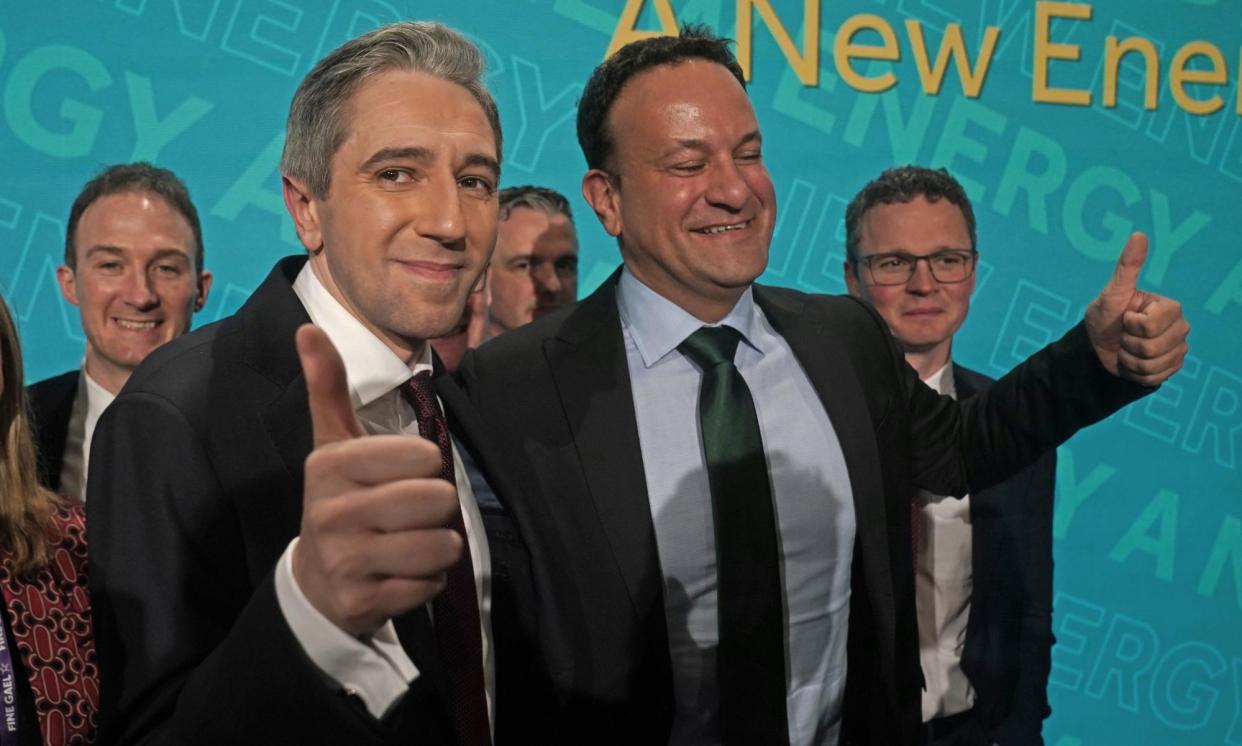‘Always in a hurry’: the rapid rise of Simon Harris, Ireland’s ‘TikTok taoiseach’

In 2012 an Irish parliamentary committee hearing had degenerated into a raucous shouting match when a voice cut through the mayhem. “Chillax,” said Simon Harris. “I think everyone needs to take a step back here.”
The 25-year-old legislator’s intervention silenced and mystified his colleagues. One wondered if chillax was Latin. Use of the word made headlines. “All the young people know what ‘chillax’ is,” Harris told the Dáil the next day.
He showed little sign of chilling or relaxing himself, however, and instead became a political vortex who 12 years later is poised to become Ireland’s youngest prime minister. His social media skills have prompted a nickname, the “TikTok taoiseach”.
On 9 April the Dáil is expected to confirm Harris, 37, as successor to Leo Varadkar, who stunned the country last month when he announced his resignation as prime minister and leader of Fine Gael.
The higher education minister blitzed potential rivals to be coronated as the party’s new leader. Fine Gael’s coalition partners, Fianna Fáil and the Greens, back him to become taoiseach.
It will be the culmination of a precocious rise for a polished communicator who has rewritten the political rulebook in Ireland but is barely known in Belfast, London or Brussels.
“At this stage there is more interest in why Leo left than who is Simon Harris but that will very quickly turn to who is Simon,” said Frances Fitzgerald, a Fine Gael MEP and former minister who mentored Harris at the start of his career.
The new taoiseach will face daunting challenges. A housing crisis and fraying public services dim the centre-right coalition’s hopes of winning an election due by next March. Farmers are chafing at environmental rules while climate activists lament missed targets. Post-Brexit relations with London are tetchy and Northern Ireland’s government is fragile. About a third of Fine Gael’s Dáil deputies are stepping down rather than face voters.
Yet Harris has reputedly yearned for this opportunity since he was a teenager. “He’s acutely and almost obsessionally ambitious,” said Shane Ross, a former Fine Gael and independent politician who served in cabinet with Harris and knew him as a newly elected legislator in 2011. “He was always in a hurry, even at that time. Very early on he declared his leadership ambitions.”
Harris has humble roots. He grew up in Greystones, a County Wicklow coastal town south of Dublin, the son of a taxi driver and a school special needs assistant, and attended St Joseph’s, a community school.
He was a keen debater and wrote a play at 13, said Neale Richmond, a junior minister who has known Harris for 20 years. “The work ethic comes from his parents, they’re work, work, work.”
Having a younger brother with Asperger syndrome prompted the 15-year-old Harris to lobby politicians for autism services, instilling a passion for public service, said Richmond. “Simon is very good craic and obsessed with politics. Always in a rush, he walks very quickly and talks very quickly. It’s all about what you can do as quickly as possible.”
Harris studied French and journalism at the Dublin Institute of Technology but dropped out in 2008 to prioritise working as an assistant for Fitzgerald, then leader of the opposition in the Senate, the upper house. “Totally committed. Would give you any time you needed, no limits,” she said, recalling.
A year later, Harris was elected to Wicklow county council with a record percentage of the vote. “He was amazingly diligent as a county councillor. A meticulous door knocker,” said Ross.
In 2011, Harris was elected as the youngest member of the 31st Dáil, leading to junior cabinet posts and in 2016 the health portfolio, dubbed “Angola” for its political landmines.
Harris impressed with his command of detail, fluency on camera and social media savvy but, like predecessors, failed to overhaul a dysfunctional health care system. He survived an accusation of leaking cabinet details, which he denied, but is said to have become more cautious with the press.
In 2020, the married father of two young children became higher education minister, a less demanding post, and used his spare time and energy to woo Fine Gael backbenchers, councillors and activists. He listened to grievances, processed requests, remembered names.
When Varadkar unexpectedly announced on 20 March that he was quitting, Harris swooped and swiftly amassed support that intimidated potential rivals with longer track records.
Observers struggle to attach any ideological label to the incoming taoiseach and wonder whether he will be Leo 2.0 – another metropolitan smoothie. “He’s mechanically and logistically brilliant but without a policy that you can identify with him at all. The evidence is that he’s pretty opportunistic,” said Ross.
Fitzgerald disputed that, saying Harris was a solution-focused social progressive who would challenge populism while promoting equality of opportunity, law and order and improved ties with London and unionists. “His strength is his networking and relationship building,” she said.
Fine Gael used its party conference in Galway this weekend to bid farewell to the old chief and hail the new. His ambition reflects a new, confident Ireland, said Richmond. “It’s the Roy Keane mentality. We’re not a second-tier country. He’s here to lead us to a historic fourth term.”


